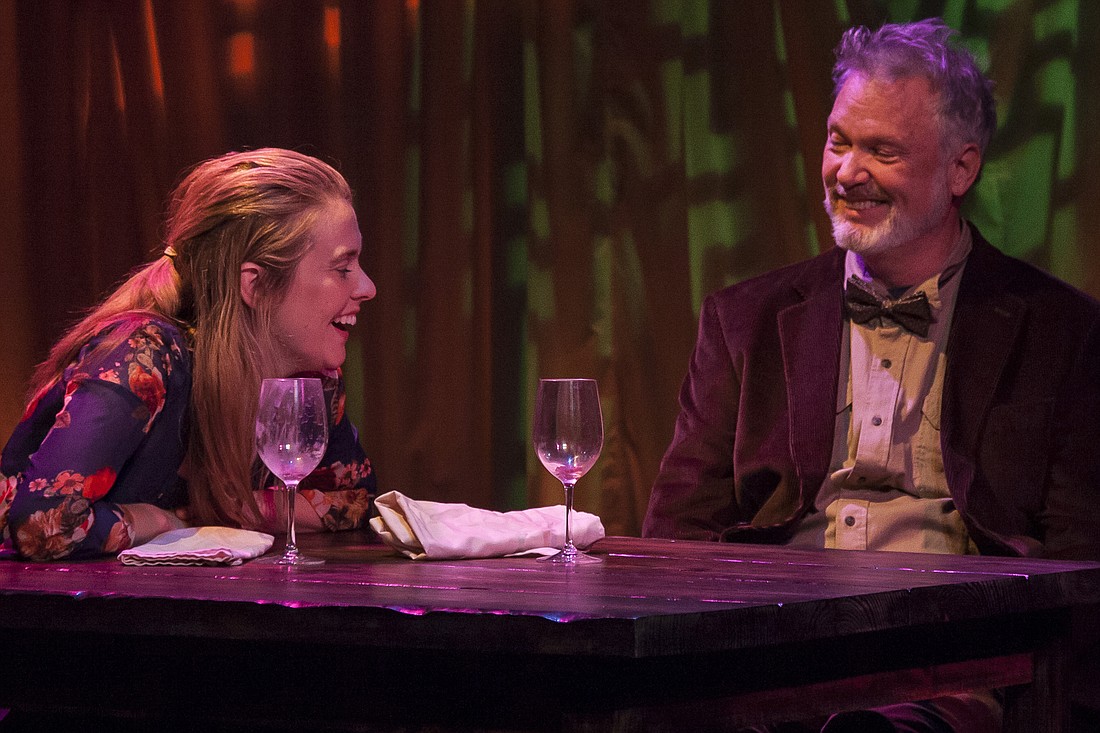- April 25, 2024
-
-
Loading

Loading

The Heisenberg Uncertainty Principle says you can’t know an object’s precise position and momentum at the same time. To put it another way, the observer affects the thing observed. And the observer can’t have it both ways.
Although I can’t be certain, that principle animates Simon Stephens' “Heisenberg,” FST’s latest production.
Stephens’ play has only two characters. The play’s plot is as old as the hills. A wacky younger woman bumps into a curmudgeonly older man. She spins his life in a different direction. Comedy, heartbreak and revelation ensue.
Stephens follows that template. And twists it beyond all recognition.
Here, the young thing is 42 years old. The curmudgeon is 75 years old. Alex (George Tynan Crowley) and Georgie (Rachel Moulton), respectively. He’s a butcher; she’s a teacher. Irish guy, American girl; both live in London. She appears out of nowhere, kisses him on the back of the neck, and their improbable pas de deux begins. Alex chooses his words carefully. Georgie talks a mile a minute, and is on the verge of manic. She gloms onto him and slathers the poor old dude with unfiltered narrative as thick as molasses. We discover that Georgie’s adult son won’t talk to her; Alex’s sister died when he was eight. She presses him — and keeps pressing him — for details. Then she asks him for money. To track down her estranged son in New Jersey, of course.
This bare-bones plot summary does no justice to the intricate ins, outs, jumps and turns of Stephens’ narrative. The plot is a drunkard’s walk that never takes the shortest distance between two points. That squiggly line seems to be the point. (More on that later.)
Crowley (an FST vet, last seen in “Outside Mullingar”) nicely embodies his reserved, crabby character. His Alex reminds me of Donald Southerland with an Irish accent. Moulton (who fell to earth in FST’s “Grounded”) does great work as the crazy girl who appears from the void. Her Georgie reminds me of Claire Danes’ character on “Homeland,” with a dash of Amy Sedaris.
The action unfolds via David Arsenault’s spare, surreal set and Jeff Cone’s costumes. Alex and Georgie are both seriously rumpled. Despite their age differences, they seem made for each other. Rob Perry’s lighting dithers from hot colors to cool. A visual nod to the Uncertainty Principle, perhaps.
Director Kate Alexander honors Stephens’ heavy debt to Harold Pinter. The talk always feels natural—and it’s peppered with the random pauses that pop up in real conversations. Talk is what this playwright cares about. In the world according to Stephens, the music of dialogue beats the chess moves of plot.
His smart, talky play is primarily comedy, with occasional flashes of pain. Crazy girl drags bitter old guy out of his shell. (Yes, I mentioned that.) Always funny, unless Madonna is doing it.
The characters do surprising things. The play is clear on what they do, but not so clear on why. That seems like a deliberate choice, not an oversight. Stephens isn’t digging for motivational gold. All that Aristotelian jive bores him.
So, backstory nuggets pop up. You learn about Georgie’s missing son and Alex’s dead sister. These never pay off with the usual epiphanies, self-revelation, reunions or long-lost memories. Alex and Georgie end the play on a pilgrimage—and find nothing. Georgie reads Alex’s obsessive 67-year diary. It bores her to tears.
And at last we close in on the point.
The normally taciturn Alex has a flash of eloquence. He says something to the effect that, “Personality is a fiction. It’s supposedly the sum total of everything you’ve ever done. But why assume you’ll keep doing the same thing?”
Introspection is a bum’s game, in other words. Know thyself? Try it. Look inside, and all you’ll find is a string of past moments. The act is as futile as reading the boring diary under the bed.
Apart from the title, Werner Heisenberg is never mentioned in the play. In the spirit of the Heisenberg Uncertainty Principle, I’m guessing the playwright is saying that you can know yourself or you can be yourself. But you can’t have it both ways.
That’s the conclusion I take. Though I can’t be certain.